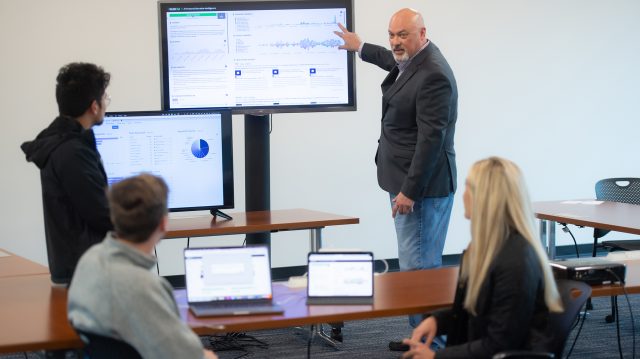
Greg Griffith (center), EdgeTheory co-founder and CPO, teaches students about narrative intelligence during a recent internship program at Insight Park. EdgeTheory is the primary tech partner for the university’s new National Center for Narrative Intelligence. Photo by Kevin Bain/Ole Miss Digital Imaging Services
OXFORD, Miss. – The Mississippi Institutions of Higher Learning has approved the creation of a new National Center for Narrative Intelligence at the University of Mississippi, the first of its kind in the country.
Narrative intelligence – a human and artificial intelligence-driven process that analyzes large amounts of data to derive meaning, trends and outcomes is particularly useful in identifying the patterns and flow of misinformation and disinformation. It has broad professional applications in various fields including journalism, health care, national security and public policy.
“Information is more prolific and accessible than any other time in our history,” said Noel Wilkin, provost and executive vice chancellor for academic affairs. “This is largely because anyone with a smartphone, tablet or computer and social media account can create, disseminate and propagate information. This makes knowing the source and veracity of information much more difficult.
“This center will make a valuable contribution to society as it develops and uses tools and strategies to ascertain the sources and veracity of information. This work is critical to our ability to make decisions and develop our opinions based on truth, not just a social media post that received the most forwards or likes.”
Joe Stradinger, CEO and founder of EdgeTheory, spearheaded the idea for the center and said Oxford is the perfect place to explore and advance the use of narrative intelligence. The Mississippi-based narrative intelligence firm with an office at Insight Park will be the center’s tech partner.
“This is the place to do it,” Stradinger said. “This is the home of narratives and storytelling.”
Andrea Hickerson, dean of the School of Journalism and New Media, and Wes Jennings, chair of the Department of Criminal Justice and Legal Studies, will co-direct the new center, which aims to enhance the exploration and understanding of narrative intelligence in the digital era.
As people increasingly seek news from sources such as social media and trust in traditional news outlets plummets, false or misleading information has become widespread and easily accessible. According to the Pew Research Center, more than 70% of Americans consider misinformation on the internet to be a major threat to society.
Foreign governments, including Russia, have taken advantage of that distrust to launch disinformation campaigns that mislead and manipulate users of social media.
Narrative intelligence can help governments, agencies and people better understand the world around them and evaluate foreign information campaigns more effectively, Stradinger said.
“We’re not here to shape narratives; we’re here to understand narratives,” he said. “We’re here to study how narratives affect the world.”
Whereas a person may read 100 articles or posts to determine the truth of an event or statistic over a number of hours, artificial intelligence can parse through 10,000 articles, synthesize the data collected and produce a summary in seconds, Jennings said.
“And even if you do it by hand, it’s static,” he said. “The entire narrative that I just produced could change tomorrow.
“AI can do that perpetually. It’ll keep updating and you’ll have a living, breathing, immediate and relevant time stamp on whatever information you’re interested in.”
Though the center is primarily a research facility, administrators also plan to offer opportunities for students, faculty, staff and community members to train in the use of narrative intelligence for education, research and certifications, Jennings said.
“People are bombarded with information all the time and it is based on the algorithms for purveyors of this kind of content – it’s geared and tailored for what you’ve read before and what it thinks you’re interested in,” he said. “We want people to be in a diverse and inclusive world and environment who have all the information at their disposal, but still filtered through the lens of truth.”
The center presents an opportunity for cross-disciplinary collaboration, as the use of narrative intelligence can benefit a variety of fields, Hickerson said.
“Artificial intelligence is going to influence every profession,” she said. “I’m excited about the center because my vision for journalism and communications is that we are central to problem solving and making sense of information.
“That’s what journalism is – making sense of accurate information. It’s hugely powerful to me to have the School of Journalism at the head of this endeavor.”
As artificial intelligence and its applications become readily available, it’s important for businesses, governments and individuals to know how best to use them, Stradinger said. With the new center in place, Ole Miss is poised to teach them.
“Narratives change culture, affect economies and win wars, and too many governments and companies don’t understand their importance, or how they work,” he said.
“Narrative intelligence will continue to play a huge role in the success and security of nations and industry, and Ole Miss is now positioned to be a world leader in helping governments and companies understand it all.”


